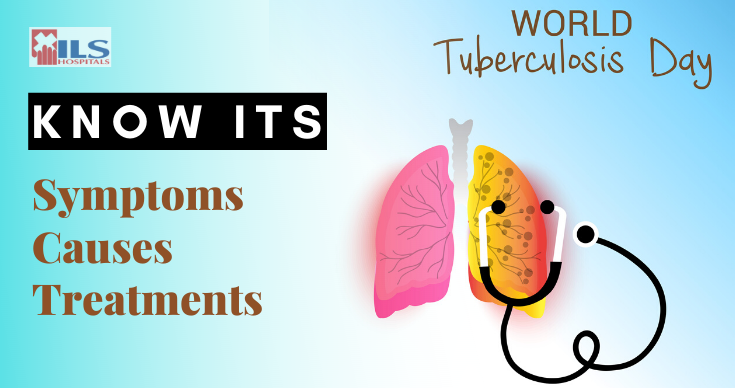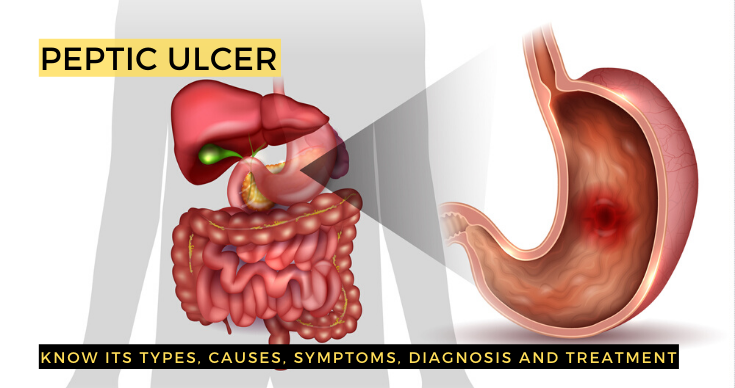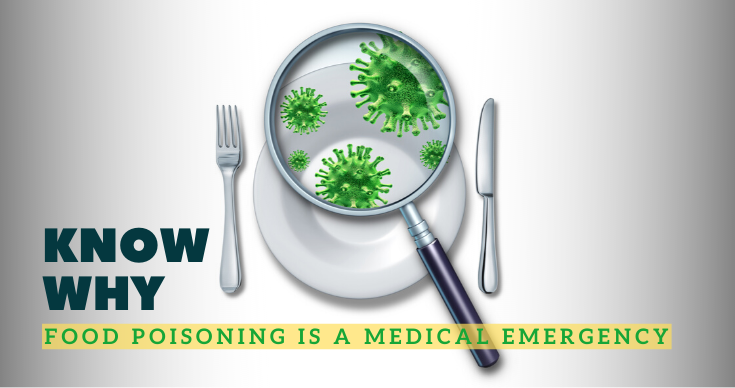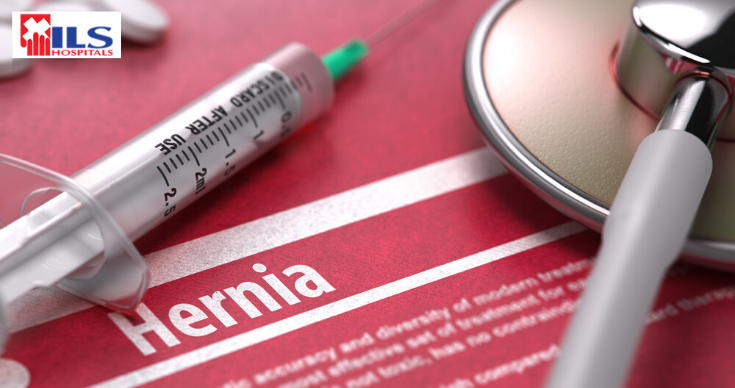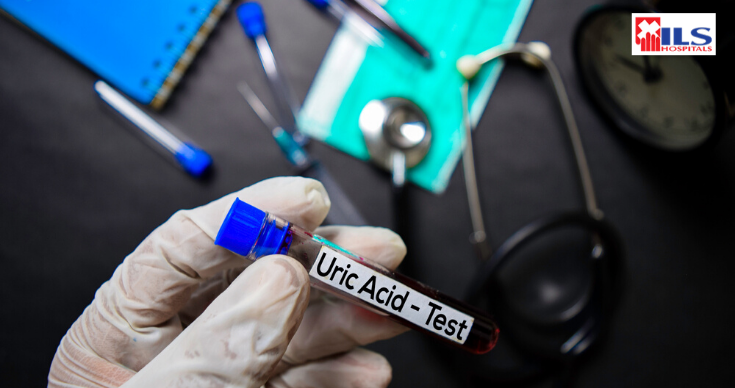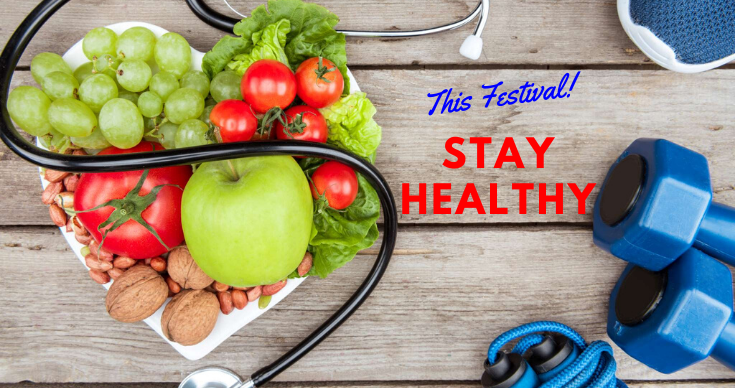Tuberculosis: Types, Symptoms, Causes, Diagnosis And Treatment
Tuberculosis is a communicable disease caused by the bacteria, Mycobacterium tuberculosis. The bacteria mostly affect the lungs (Pulmonary Tuberculosis) but can spread to other parts of the body, kidney, spine, brain, liver and so on.
Today, ILS Hospitals one of the best hospital in Kolkata and Agartala will give you detailed information regarding Tuberculosis.
Types
The two main types of Tuberculosis are as follows:
1. Latent Tuberculosis:
It is a non-infectious, symptomless TB infection that can later progress into active TB. If you have latent TB you will require treatment to prevent it from becoming an active one.
2. Active Tuberculosis:
As the name suggests, it is an active and contagious TB infection that causes various symptoms in the patient.
Signs & Symptoms
The signs and symptoms of active TB infection are as follows:
-
Chest pain
-
Shortness of breath
-
Cough that lasts for more than 2 weeks
-
Weakness or Tiredness
-
Loss of appetite or Decreased appetite
-
Fever and Chills
-
Night sweats
-
Rapid weight loss
-
Lymph nodes or Swollen glands (mostly at the sides and base of the neck)
-
Haemoptysis or Coughing up blood.
Causes
Young children and people with weak immune system are at a higher risk of getting infected by Mycobacterium tuberculosis. The causes of Tuberculosis are as follows:
-
Weak immune system
-
Breathing in the air infected by the person with TB infection
-
Chronic diseases, like diabetes and kidney diseases
-
HIV
-
Malnutrition
-
Smoking
Diagnosis
The diagnostic tests involved with Tuberculosis are as mentioned below:
-
TB Blood test
-
TB Skin test, in which the laboratory technician injects a small amount of PPD tuberculin into the lower arm to check for swelling after two to three days
-
Sputum test
-
Chest X-ray, the most reliable diagnostic method
Treatment
The treatment depends on whether you have active or latent TB.
1. Latent TB:
The main goal is to prevent the bacteria from becoming an active one. For that, you’ll be prescribed antibiotics as your TB treatment.
2. Active TB:
Drugs and medications for several months are recommended for treating active TB.
People diagnosed with Tuberculosis should complete their entire medication course to prevent TB bacteria from becoming drug-resistant.
If you are suspecting any of this symptoms, get an accurate diagnosis and complete treatment for Tuberculosis from ILS Hospitals one of the best hospital in Kolkata, Howrah and Agartala.
How To Add Enough Vitamin K In Your Diet
Do you know what Vitamin K is? Like all other vitamins, Vitamin K is another vitamin vital for the human body. So, what makes Vitamin K essential for our bodies?
Vitamin K is responsible for the clotting of blood or coagulation. Coagulation is a vital process that helps prevent excessive bleeding after a cut or injury. The said vitamin also helps in bone metabolism and calcification. Vitamin K deficiency is a serious condition and can lead to many health issues including:
– Decreased bone strength
– Osteoporosis
– Tooth decay
– Coronary Heart Disease
– Certain types of cancer.
Do you know the symptoms of Vitamin K deficiency? They are mentioned as follows:
-
Heavy menstrual bleeding
-
Easy bruising
-
Excessive bleeding during cuts, injuries, injection or surgical sites
-
Presence of blood in the urine or stools
-
Bleeding in the gastrointestinal (GI) tract.
Today, ILS Hospitals, one of the best hospitals in Kolkata, would like to give you a list of food items that are rich in Vitamin K so that your body never lacks in this essential vitamin. Before we proceed further, let’s make you know that there are mainly two types of vitamin K – K1 and K2. Vitamin K1 is derived from plant sources whereas we acquire vitamin K2 from animal products.
Make these Vitamin K-rich foods a part of your daily diet!
Soybeans
Soybeans, the only plant-based food that contain both vitamin K1 and K2, a relief for vegetarians who cannot get their vitamin K2 supply from meat sources. Apart from the mentioned fact, soybeans and soya chunks are an excellent protein provider for non-meat eaters. You can also consider cooking your meals in soybean oil as the oil contains not only vitamin K but also other pivotal nutrients, like polyunsaturated fatty acids, omega-3 fatty acids etc.
Leafy Greens
Green leafy vegetables are another plant-source for vitamin K. If you want to have sufficient vitamin K in your diet, eat lots of spinach, mustard greens, broccoli, lettuce, cabbage, beet greens and so on.
Eggs
The yolk of an egg has more vitamin K than the white portion. It is always advised to consume eggs for receiving adequate nourishment. You may eat boiled eggs daily for a healthy body.
Pumpkin
Another vegetable that contains vitamin K is pumpkin. One cup of cooked pumpkin has almost 1.96 mcg vitamin K1. So, do include pumpkins in your diet.
Other good sources of vitamin K are chicken, pine nuts, blueberries, dried basil, sage and thyme etc.
To get your customized diet-chart, visit ILS Hospitals in Kolkata and Agartala.
Peptic Ulcer: Types, Causes, Symptoms, Diagnosis And Treatment
A peptic ulcer is an inflammation that develops in the lining of the stomach, the lower part of the esophagus and upper portion of the small intestine. It is a gastroenterological condition and thus, treated by gastroenterologists. They are open lesions and mainly of three types based on their location as follows:
-
Gastric (stomach) ulcer: Ulcers that occur in the stomach.
-
Esophageal ulcer: Ulcers that happen in the esophagus.
-
Duodenal ulcer: Ulcers that develop in the upper portion of the small intestine.
It is important to know why peptic ulcer happens in the first place. The primary reason behind the occurrence is when the stomach acids responsible for digestion damages the lining of the stomach and sometimes even travel to the esophagus causing esophageal ulcer. The bacteria Helicobacter Pylori (H. Pylori) also contributes by inflaming the lining of the stomach. Surely, other causes are present as well which you’ll find below:
-
Smoking
-
Overuse of over-the-counter drugs
-
Infection from H. Pylori bacteria due to consuming contaminated food, water, using uncleaned utensils etc.
-
Overconsumption of alcohol.
Let’s now focus on the symptoms of a peptic ulcer.
-
Indigestion
-
Heartburn or acid reflux
-
Vomiting or regurgitation
-
Bloating and burping
-
Belching
-
Black stools
-
Nausea
-
Fatigue
-
Unintentional or unexpected weight loss
-
Loss of appetite
-
Pain in the abdomen and chest
-
Facing difficulties in breathing.
A diagnosis is always needed to confirm any medical condition. Apart from the mandatory physical examination in which the doctor check for bloating and pain, certain other crucial diagnostic tests can also be prescribed by the medical professional for an accurate diagnosis. They include:
-
Blood test – to determine the presence of H. Pylori bacteria.
-
H. Pylori stool antigen test – to look for H. Pylori infection.
-
Urea breath test or H. Pylori breath test – to conduct this test, the patient is asked to consume something with radioactive carbon (either in pill or liquid form) and then the breath samples are taken for lab testing procedure which accurately confirms the existence of the bacteria.
-
Gastroscopy – an endoscope is anaesthetically inserted inside the patient’s mouth to view the stomach, duodenum and esophagus for ulcers.
-
Endoscopy biopsy – the same as gastroscopy and in case of an ulcer detection, the samples are taken for clinical purposes.
The treatment options are as follows:
1. Antibiotics (to kill the bacteria, H. Pylori)
2. Antacids (to neutralize the stomach acid)
3. Cytoprotective drugs (to protect the mucous lining of the stomach)
4. Surgical treatment (if the above method fails and the ulcer recurs)
Get accurate diagnosis and treatment for peptic ulcer only from ILS Hospitals, one of the best hospitals in Kolkata and Agartala.
What Is Food Poisoning? Is Food Poisoning A Medical Emergency?
Food nourishes our body but sometimes it can even become poisonous due to the presence of dangerous bacteria, parasites and viruses like Salmonella, E.Coli, Listeria, Trichinella, Toxoplasma, and Norovirus. Food poisoning is a common gastrointestinal condition caused by the consumption of infected or contaminated food. If left ignored, it can even become a medical emergency.
Today, ILS Hospitals would like to discuss food poisoning in brief. So, read this blog to understand more about this unpleasant medical condition.
Symptoms
There are always tell-tale symptoms of any medical condition. The symptoms of food poisoning are mentioned below:
-
Nausea and vomiting
-
Diarrhoea
-
Poor appetite
-
Abdominal cramps
-
Fever and chills.
Immediately rush to the hospital’s ER if the above symptoms persist for more than three days and when you notice severe symptoms as shown below:
-
Dehydrated body (dry mouth and no urine)
-
Blood in vomit, stool or urine
-
Dizziness and weakness
-
High fever
-
Hazy vision
-
Muscle cramps
-
Severe weakness.
Causes
Apart from certain bacteria, parasites and viruses, are there any other causes for food poisoning? Yes, the following can also cause food poisoning.
-
Eating raw or undercooked eggs, fish, chicken and other meats
-
Eating uncleaned or not properly washed fruits
-
Consuming raw and imperfectly cooked vegetables and leafy greens like cabbage, spinach, tomatoes, cauliflower, mustard greens etc.
-
Preparing food without maintaining any hygiene
-
Drinking unpasteurized milk and consuming its products
-
Having improperly stored food.
Diagnosis
The doctor will diagnose your food poisoning through physical exams and by keeping note of your medical history and present condition. In the case of food poisoning, you’ll be prescribed these primary diagnostic tests by the medical practitioner:
– Samples of the eaten food
– Blood test
– Stool test.
Treatment
Mostly, food poisoning cases solve on their own by doing the following things:
-
Sipping plenty of fluids and oral rehydration solution (ORS)
-
Eating a bland and nutritious diet
-
Avoiding spicy, fatty and oily foods
-
Eating lighter meals
-
Consuming vegetable soups and fruit juices
-
Avoiding dairy and dairy products
-
Taking plenty of rest
-
Having medicines prescribed by the medical professional.
If the condition still doesn’t get better, then it might indicate a serious medical condition. Food poisoning is surely a medical emergency if it lasts for many days and the symptoms get worse. So, always eat fresh, clean and properly cooked food. Also, ensure that the food is prepared by freshly washed hands. Come to ILS Hospitals in Kolkata or Agartala for any medical help.
Let’s Know Everything About Computer Vision Syndrome
Everything has pros and cons including our digital world. While the digital world has given us access to vast information and improved our lives, it surely made our eyes pay the price. Constant engagement with digital devices like computers, smartphones, tablets, and television can cause a lot of strain and eye-related problems. This is called Computer Vision Syndrome or Digital Eye Strain.
ILS Hospitals, one of the best hospitals in Kolkata, would like to enlighten everyone on this particular syndrome. Since we know the main culprit behind Computer Vision Syndrome is being engaged for prolonged periods with a computer or other digital devices generally at work , it becomes important to minimize contact or get frequent breaks for protecting the eyes. When we work on a computer, our eyes overwork due to constant focusing and refocusing, also the brightness and glare from the monitor screen affect the eye vision.
Computer Vision Syndrome does not differentiate between a person’s age. It can happen to both children and adults. Here are some more common reasons responsible for digital eye strain.
-
Using computer, smartphones, e-reader etc. in improper lighting
-
Wrong body postures
-
Untreated vision problems
-
Incorrect monitor viewing distance.
Let’s look at the symptoms of Computer Vision Syndrome.
-
Overexerted eyes or eyestrain
-
Vague or blurred vision
-
Dry eyes
-
Pain and discomfort in the eyes
-
Itchy, irritated, and red eyes
-
Headaches
-
Pain in areas like the neck, back, and shoulder.
Computer Vision Syndrome can be easily diagnosed by an ophthalmologist through an inclusive eye examination. So, is there any solution for preventing and treating Computer Vision Syndrome? Certainly yes, just look at the tips below:
1. Maintain proper posture at the workplace:
Almost a majority of people have a job that demands them to work in front of a computer. You cannot avoid the computer but can surely do things like sitting on a proper back-support chair and following minimum monitor viewing distance of 20 inches. Also, keep your back straight and sturdy.
2. Use eye protection software and apps:
Digital devices like computers and smartphones emit blue light that can even damage retinal cells so install a blue eye filter software or app in your office computer and your smartphone. You should customize the display settings of your device as well.
3. Get anti-glare computer glasses:
You should consider anti-glare computer glasses if you spend more than three hours in front of a computer.
You can always consult an eye specialist from ILS hospitals in Kolkata and Agartala to get a proper diagnosis and prescription for computer power glasses.
Do You Want To Stay Healthy During Seasonal Changes? Read This Blog.
Winter season is knocking on our doors with full swing. Time to relish on hot beverages and hot dishes. We eagerly wait for winters to arrive so that we can get a respite from unpleasant, sweaty and humid temperatures. But we tend to ignore that winter is accompanied by obnoxious colds and cough, even fever. This happens due to change of season and the fact that our immune system slows down in low temperatures.
Here, we, at ILS Hospitals, one of the best hospitals in Kolkata, presents you with some suggestions on how to stay healthy during this winter season. So, let’s take a thorough look at these suggestions.
1. Practice good hygiene:
We try to avoid water during winters and discount the importance of hygiene. Bad hygiene habits are one of the main reasons for flu and common colds. Some essential good hygiene habits that you should religiously follow even during the flu season are shown below:
– Properly wash your hands before and after eating and after using the restroom
– Bath regularly with warm water
– Wear clean clothes and woollens
– Brush and floss your teeth daily
– Keep your surroundings clean
– Wash your hair frequently.
2. Eat seasonal food:
There’s a reason why we have certain fruits and vegetables only available during winters. Even Ayurveda believes in following a “ritucharya” diet which means eating according to season. Eating seasonal food has many advantages on your body including strengthening immunity. You should consume seasonal fruits and vegetables like the following:
– Oranges
– Mustard greens
– Spinach
– Beets and Carrots
– Peas
– Dates
– Strawberries
– Cauliflower
– Cabbages.
3. Make the sun your best friend:
Winter sun is the best because it does not have a burning effect on our skin, although winter sun still radiates harmful UVA and UVB rays so always apply sunscreen before your winter sunbathing sessions. Also, keep your mattresses, blankets and pillows under the sun to make them germ-free. Allow your rooms the warmth of sunlight to get rid of viruses and microbes and make them well-lighted. Also, Vitamin D is crucial for a good immune system which you can get from sunlight, so do not shy away from the winter sun.
4. Dress warm:
Wear proper winter clothes that keep you warm throughout the day. Always cover your ears with earmuffs, your feet with woollen socks, your head with a woollen cap or beanie and neck with a cosy muffler whenever you go outside.
We hope you follow these above-mentioned suggestions during winter months. Winters can be really enjoyable if you take good care of your health. If you experience any health-related problems, come to ILS Hospitals, one of the best hospitals in Kolkata to get a professional medical consultation.
Acquaint Yourself With These 4 Different Types Of Hernia
A hernia is an abnormal bulge in the affected area that occurs when the organ or fatty tissues comes out through a weak muscle opening. Hernias are painful and if left unaddressed or untreated can become serious and dangerous (a hernia can strangulate and even burst that leads to grave consequences).
Hernia repair surgery is the ultimate and preferable hernia treatment by the doctors. Most people are not familiar with the different types of hernia. So, we thought to acquaint you with 4 different hernia types for your awareness.
Here are different and common types of hernia
1. Inguinal Hernia
In case of inguinal hernia, a part of the intestine exists through a weak opening in the abdominal muscles. Some symptoms of inguinal hernia are as follows:
-
Pain in the groin area while coughing and lifting anything
-
A visible bulge in the groin area
-
Swollen and painful scrotum or testicles in men.
2. Incisional Hernia
Incisional Hernia occurs due to an unhealed surgical wound of abdominal surgery. The symptoms of an incisional hernia include:
-
Redness and swelling in the bulge
-
Constipation
-
Nausea and vomiting.
3. Umbilical Hernia
This type of hernia is commonly found in new-born babies but that does not mean adults do not encounter umbilical hernia at all. An umbilical hernia is formed in the belly button due to protrusion of an organ or fatty tissues. A few symptoms related to this hernia are as shown below:
-
Painful and discoloured bulge
-
Fever
-
Vomiting
-
Pain in the abdomen.
4. Hiatal Hernia
If the upper part of your stomach exits from its assigned spot and enters into the chest cavity, then it’s known as a hiatal hernia. A hiatal hernia happens due to various reasons like injury or certain surgeries, obesity, old age and abnormal hiatus. The symptoms of hiatal hernia are the following:
- Difficulty swallowing food
- Acid reflux
- Regurgitation or vomiting
- Chest pain
- Abdominal pain
- Constant belching or burping
- Vomiting blood
- Black stools.
There are many more types of hernia but these 4 types are quite common. A hernia cannot be left on its own and should be taken seriously. We offer general and laparoscopic hernia treatment to our patients with this condition. We are one of the best hospitals in Kolkata due to our perfect infrastructure, expert medical team and the latest facilities.
How Dangerous Is Hyperuricemia Or Higher Level Of Uric Acid?
To say the least, an “excess of everything is bad”. Hyperuricemia certainly reminds us of this good old proverb. Hyperuricemia is a serious medical condition of high uric acid concentration in the blood. The uric acid levels should be within the normal range or else it may result to many serious and unpalatable health conditions. If your uric acid crosses the normal and expected levels then you have high uric acid levels. You have high uric acid levels when your uric acid is more than 6 mg/dL if you’re a woman and greater than 7 mg/dL in the case of a man.
The main concern is to know whether hyperuricemia is dangerous or not. Hyperuricemia can be injurious and dangerous if one turns a blind eye to it as it can result in many chronic and serious diseases of essential organs like heart and kidney.
Our body excretes uric acid through urine but if the body starts making excess uric acid then it puts pressure on the kidneys to get rid of them. The body makes uric acid through purines which we receive from certain foods (seafood, red meat, some vegetables, mushrooms, alcoholic drinks, etc). An excess of uric acid means you are eating a lot of purines in your diet, thus your extra uric acid will crystallize in mostly your joints and kidneys producing pain and inflammation.
There are a few serious medical issues that are a plain result of hyperuricemia and by default, they help to determine hyperuricemia. They are as follows:
-
Gout (swollen, tender and stiff joints)
-
Kidney stones
-
Kidney diseases and even renal failure
-
Diabetes
-
High blood pressure
-
Cardiovascular conditions.
So what are the causes and are you at risk of hyperuricemia? Let’s see the points below.
-
Obesity
-
Excessive alcohol consumption
-
High-purine diet ( which include alcohol, seafood, and liver meats)
-
The incapability of kidneys to filter properly
-
Certain medications
-
Heredity
To keep your uric acid within the normal range, your doctor will recommend you some drugs or medications as a treatment. If you’ve developed other medical conditions associated with hyperuricemia, then you will be directed to the doctor respective to your condition for treatment. For instance, if you have diabetes, you will require diabetes treatment along with the treatment for hyperuricemia. You will also be required to follow a purine-restricted diet (which include healthy nuts, eggs, low-purine vegetables, and fruits) to normalize the dangerously high levels of uric acid.
Diagnosis of hyperuricemia is done by conducting blood (serum uric acid test) and urine tests.
We, at ILS Hospitals, provide diagnostic tests for high uric acid levels to our patients. ILS Hospitals is one of the best hospitals in Kolkata for diagnostic and accurate medical treatment.
8 Tips To Stay Healthy During The Festival Season
It is the festive season, the month we all wait for every year. This is the time when we get to enjoy the most with our family and friends. But if during this time anyone gets sick, then all plans are bound to go down the drain. So, ILS Hospitals in Kolkata is going to give you tips on how to stay healthy and disease-free during this time.
-
Over the last few years, the rain has been an ever-present factor in the festival season especially before diwali, which also makes it easy for diseases like malaria and dengue to fester. So use mosquito repellent when going out and a net when going to sleep.
-
Viral infections like cough, cold, and fever are also very common during this season. Don’t drink cold water or cold drinks after coming from outside. Try to avoid them as much as possible, even at home. This will prevent you from getting infected with a cold infection. Especially at late night, the temperature falls and the chances of getting a cold increase. So try to avoid cold drinks, ice-creams etc. at night.
-
While going out during the day, make sure to carry an umbrella, sunglass and sunscreen with you at all times, or you may get sun-burned badly.
-
When burning crackers during Diwali, take extra precautions against any accidental burning. Be careful about smoke and loud noises specially for the children and aged individuals.
-
Eating out during the festive season is very common and half the enjoyment is in that only. So as we cannot completely avoid eating out but rather can eat wisely. Most roadside stalls are not much healthy, so choose wisely from where you are eating. If possible, carry water from home before going out.
-
It’s also a holiday time and we like to go out more as well. Going out every day during the festive season can make one tiresome, drenched out of energy and make feel thirsty. If possible carry lemonade or ORS with you. This would help to restore the electrolyte imbalance of the body.
-
If you are going out at night then make sure that you get enough sleep during the day as good sleep is important for the body. Also, staying awake at night is not good for small children and the aged individuals. So, make sure that they get their proper sleep.
-
Try to avoid the crowd if you are an asthma patient or this may aggravate your problems and may sustain attacks of asthma. Diabetes patients should continue their diabetes treatment as usual during this time and limit eating sweets as well, especially when it can be tempting once you get so many sweet boxes from your neighbors on Diwali.
Follow these tips to stay healthy and have a great Diwali and a festive season ahead.
The 3 Different Types Of ADHD You Should Know About
You have probably heard of the term ADHD a lot. ADHD means Attention Deficit Hyperactive Disorder. If your child or anyone in your family is hyperactive or cannot concentrate on a specific task for much time, it is possible that they might be suffering from ADHD. It is a chronic condition and most of the time, it is seen among children. It may also occur in adults, but that is very rare. A person suffering from ADHD mainly shows three types of behaviors. They are inattentiveness, impulsivity and hyperactivity. Today, on behalf of ILS Hospitals, one of the best hospitals in Kolkata, we are going to tell you the different types of ADHD.
Predominantly Inattentive ADHD
The name suggests itself that someone who has this type of ADHD has difficulty in paying attention. Some of the symptoms apart from inattentiveness are:
-
If someone does not pay much attention to details of any important task or situation.
-
Everyone makes careless mistakes, but if someone makes a lot of careless mistakes all the time, it is worrisome.
-
Due to inattentiveness, they will fail to pay attention and keep on doing the piece of task again and again.
-
Zoning out or not listening when someone is talking is a pretty common occurrence.
-
Being unable to follow or understand instructions.
-
Avoiding tasks that involve effort.
-
Being distracted or forgetful is also a sign.
-
The habit of losing things regularly that are needed to complete tasks.
If you have at least five symptoms out of eight, then you are most likely to have this kind of ADHD.
Predominantly Hyperactive-Impulsive ADHD
It is more common in kids. If your kids are very hyper-active and move a lot around constantly then it is possible that they have this condition.
-
Fidgeting and Squirming a lot.
-
Getting up often or not being able to stay at one seat for a long time.
-
Running or climbing anywhere at inappropriate times.
-
Having trouble playing quietly.
-
Talking too much.
-
Talking out of turn or blurting out the first thing that comes into mind.
-
Interrupting a lot in between other’s conversations.
Combined ADHD
As the name suggests combined ADHD is caused if you have symptoms combining both the other types. If you are both inattentive and hyperactive, it’s a more severe condition. Combined ADHD is the most common type of ADHD. People showing only one or two symptoms doesn’t likely have ADHD. Most people who have ADHD have these symptoms on a more severe level.
Usually, for kids, these symptoms can be detected easily before they turn 7 years old. But there is no particular test to diagnose the type of ADHD. In a lot of cases, the symptoms tend to change over time especially in adults. ILS Hospitals, being one of the best hospitals in Kolkata, provides effective treatment in the form of therapy and medication.











